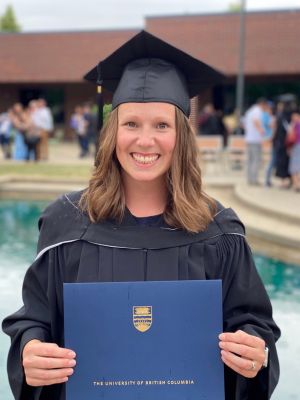 Kyla Henry’s (BEd’ 15, MEd’ 23) journey into the field of education began in the same school where she now works as a teacher.
Kyla Henry’s (BEd’ 15, MEd’ 23) journey into the field of education began in the same school where she now works as a teacher.
“After high-school when I was contemplating what to do next, I felt pulled towards education,” says Henry. “I always loved working with children, and I had so many great teachers growing up who really made an impact on me.”
Reflecting on her first day of the Bachelor of Education program, Henry shared that many of her colleagues seemed to have ‘teaching in their blood’ while her passion for education developed a little differently. Raised in a household that cherished books, Henry developed a love for reading and language at an early age, laying the groundwork for her future career — and research.
Early in her career as a French immersion elementary school teacher, Henry recognized the importance of developing her students’ literacy skills, but didn’t quite know the best way forward. Motivated by a desire to deepen her understanding and support her students better, she spent time over her maternity leave learning about new approaches. Always the lifelong learner and inspired by what she had learned, she made the decision to pursue a Master of Education with a capstone project.
“I felt a weight of responsibility towards my students, knowing that I needed to equip myself with the knowledge to help them succeed,” she says. “I knew that in order to truly make a difference in my students’ lives, I needed to continue my own learning journey.”
Henry’s capstone project drew inspiration from an investigative podcast. The podcast’s reporter, Emily Hanford, discussed the different types of methods associated with how to best teach reading.
“The podcast discussed research conducted by a number of different practitioners in different fields, and I was astounded to learn that I had been using methods that were basically disproven, and that set the direction for my capstone.”
Henry found that there was a research gap when it came to teaching reading in French immersion. She decided to focus her project to applying the English Science of Reading research to the French immersion context.
“Completing my MEd was transformational in so many ways,” says Henry. “My classroom practice now is very different. For example, as part of my project I created a scope and sequence of what the kindergarten year looks like in literacy, and it really made me think deeper and more intentionally about what I’m doing, and how I’m targeting all learners, especially those students who need more or different types of exposures.”
She has also implemented different activities in her classroom, such as articulatory gestures, where she teaches her students about sounds, how they are represented by different letters and where the sounds ‘live’ in their mouths.
As a passionate advocate for literacy education, Henry’s impact extends beyond the walls of her classroom. She developed and delivered a professional development workshop, Enhancing Early Literacy in the French Immersion Context.
“Once I understood that much of the research for English readers is also valid for our French learners, I wanted to find practical ways to share this with colleagues that could be taken into the classroom to enhance instruction,” Henry explains. “In the workshop, I shared the research and also strategies for how it could be applied to the classroom.”
For teachers who are considering how they can implement changes in their classroom, but maybe feeling a little overwhelmed, Henry shares this advice.
“It’s completely normal to have feelings of doubt or inadequacy – we’ve all been there. If you’re wondering about something, don’t stop wondering. Don’t leave it there. Take the time to seek out some answers. Try to find some colleagues to work with, set up an inquiry group or seek out resources. Just be curious, and don’t let it stop there.”